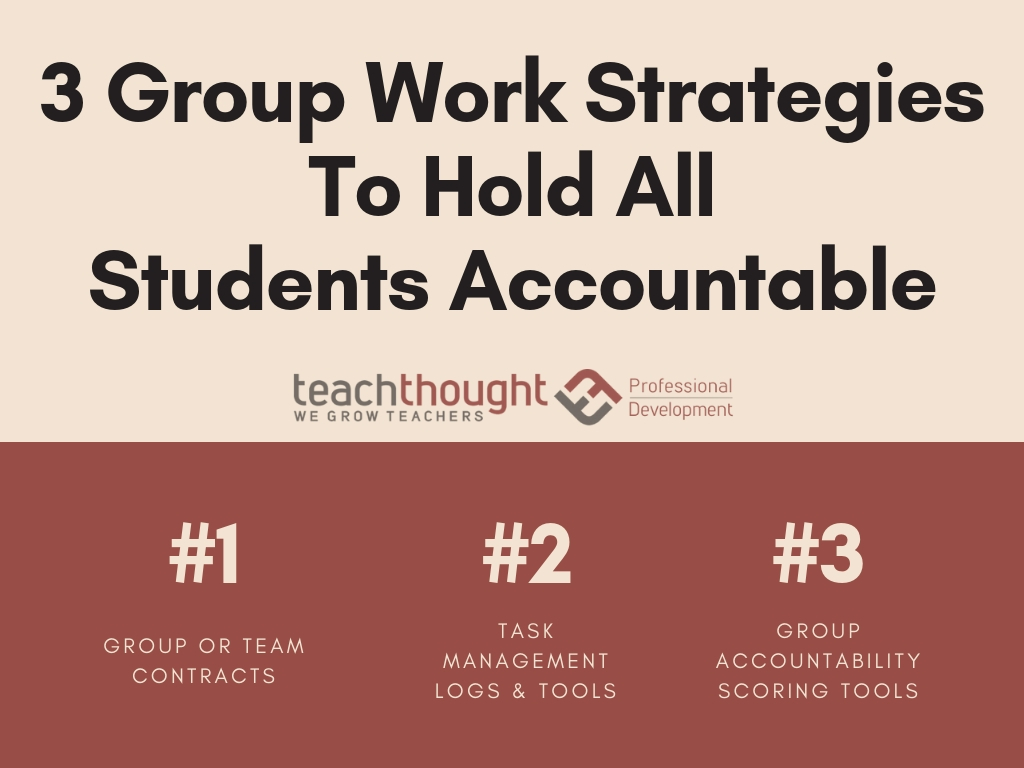
What Are The Best Group Work Strategies For Holding All Students Accountable?
contributed by Drew Perkins
We love and encourage collaborative work between students (and teachers) and this is a staple in project-based learning to be sure. it can be a powerful tool to build capacity and skills in a number of ways but it can also be problematic.
One of the inevitabilities in the group or teamwork teachers often use in schools is the difference in how much each group member is contributing to the ongoing work. There are a few ways to counter this and help students grow in the process.
Outside of the typical ‘I don’t like him/her’ complaint, higher-achieving students frequently protest (often quietly) because they feel like they’re doing more work than some or all of their group. They’re often right.
Parents complain because their child tells them they are shouldering more of the load than what is fair and sometimes that load gets pushed to the parents. For those who are concerned about their grades, the usual response is to complain behind the scenes but go ahead and do the extra work to avoid a poor score. So how do we hold students accountable for their contribution, work, growth, and learning in a way that is equitable and builds collaboration and communication skills simultaneously?
Start with group/team contracts. Student contracts can be used as a sort of rubric for collaboration expectations and norms and I encourage student voice in creating them as much as possible. It can be helpful to provide a starting point, even a template, for students to modify and/or add to instead of creating this contract from scratch. The template might include guiding questions like:
- What do we expect of each other?
- How will we know we’re pulling our weight?
- What will happen when one or more of us doesn’t meet the group’s expectations?
The idea is to establish a guide for quality collaboration and procedures for dealing with the possibility of someone not meeting expectations. In our PBL Project Design Rubric, we’re striving to help “…students move toward autonomously managing the process” and this contract should include some due process for group members to manage for “slackers” prior to the teacher stepping in. Sure, you might need to monitor and facilitate some of that conversation but we want students to shoulder as much of that as they are capable of.
If the group or teamwork is taking place over a longer period of time or involves multiple steps or pieces consider requiring groups to use tools like a task management log, work plan, and/or reflection logs of work completed. If we’re replicating actual workplace environments we might see this in practice as tools like Slack.
The idea is a clear way to communicate about who is responsible for what, when it’s due, and when it’s been done. In a PBL setting, we might call these milestones and they are often tied to our formative assessments.
Finally, when the work or project is done and it’s time to divvy up the points consider a system that rewards those who pulled their weight and perhaps some of the weight of the ‘slackers.’ Awarding the same amount of points or the same grade to all group members regardless of contribution creates resentment and frustration so why do it?
Instead, I like scoring the group as a whole and then giving them a form like the one below where they have to divide the points up according to the work and value-added. Those students who did what was expected of them (or more) should get more points than those who didn’t but the total has to add up to the overall group score multiplied by the number of group members.
Again, my goal is to move towards students autonomously managing the process so I suggest having them talk through this process on their own as much as possible. It is important, of course, to modify for age level and situation.
There may be a group member who tries to bully the others or doesn’t have an accurate sense of their contribution and this is where the teacher/facilitator steps in as much as needed to keep problematic conflicts from occurring. Sometimes students will express discomfort with having these hard conversations but I think they’re vital learning opportunities when supported well by the teacher/facilitator.
For younger grades and in some situations you might make them anonymous or other similar modifications but in the end, the idea is that students are rewarded for the work they contributed, including the slackers.
Teaching students in groups has value but just plopping them in 3’s or 4’s without thoughtfulness about how to get the most out of them can lead to resentment and frustration. Instead, consider how you might design for those inevitabilities and create teachable moments for skill-building in addition to the ‘content’ learning you’re hoping to achieve.